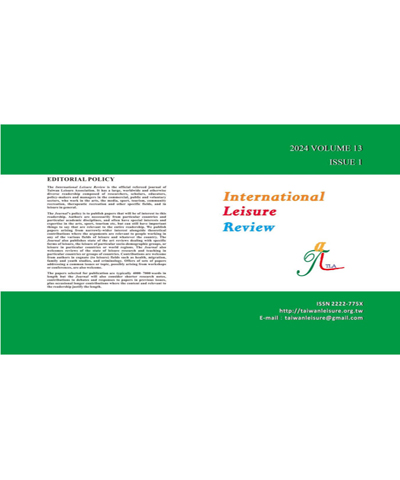
International Leisure Review
社團法人台灣休閒協會,正常發行
選擇卷期
- 期刊
Purpose of the study: The present study investigated the current use of school sport facilities by communities in Hong Kong and barriers that prevent these facilities from opening to the public. Research method: A literature review was conducted using SPORTDiscus, ERIC and the China National Knowledge Infrastructure. A self-constructed questionnaire was developed based on the literature. "Survey Monkey" was used to collect information from the e-questionnaire. Invitation emails were sent to 840 schools in Hong Kong and 138 valid questionnaires were returned. After the survey data analysis, four schools were selected for interviews. Results: Schools from overseas and mainland China felt a responsibility to promote sport opportunities and stimulate school communalization. However, only 23.2% of local schools were willing to open their sport facilities to communities, citing barriers such as legal liability, expensive insurance and few operating resources. Conclusion: After reviewing the global development of school communalization, Hong Kong, as an international metropolis, is left behind. Government agencies could facilitate this process by enacting laws mandating shared facilities and increasing resources. If schools are supported, barriers can be reduced or eliminated, and ultimately, schools may be more willing to open their sport facilities to their community.
- 期刊
Nowadays, adolescence is one of the foremost contemporary topics in psychological literature, and leisure is one of the most significant life contexts/activities/experiences adolescents deal with in daily life. Though, understanding the match between leisure and adolescents' development to improve healthy and meaningful lives is still an open debate. The present article discusses the interplay between adolescence, leisure experience, flourishing and boredom, sharing a new approach to understand leisure experience and its role in adolescents' lives. For this, we present a crossed relation between a continuum of low-high flourishing experience and low-high boredom experience, discussing their interception and related outputs expressed in terms of four styles of leisure experience: optimal leisure experience; challenging leisure experience; apathy leisure experience; and risky leisure experience. These four leisure experience types, being conceptually organized, open new and insightful directions for future leisure studies. Besides, give new inputs about the role of optimal leisure experience to promote positive development, showing the importance of integrating several experiences that co occur in adolescents' daily lives.
- 期刊
Launched in December 2015, the Nyege Nyege musical festival has become a popular leisure tourism activity in Uganda attracting national and international participants. The festival involves an all-night event characterized by wild partying and diverse leisure activities usually lasting four days. Despite its growing popularity, the festival has received sharp criticisms in the national media and other public forums across the country. The barrage of attacks against the festival are premised on cultural, moral, and religious ground. Critics argue that Uganda being a strong cultural and religious conservative society should regulate (and restrict) leisure activities that deviate from the culturally and religiously acceptable moral behaviors and expectations. In this paper, we analyze the paradox of promoting Nyege Nyege music festival - a post-modern leisure practice within a morally sensitive environment. We argue that unregulated embracement of festivals expose society to foreign cultural influences of the so-called progressive contemporary neoliberal post-colonial leisure economy. This paper contributes to the body of knowledge on leisure and tourism with implications for unraveling its potential for diversification of tourism products in Uganda and the moral dilemmas that come with it.
- 期刊
Although overseas travel is prohibited for Taiwanese citizens, many amenities have not been closed by June 2021. There are still a lot of options for leisure activities. People are still able to go outdoors and do whatever they like; they can still dine at restaurants, have a picnic in a park, or go to a shopping mall. Leisure activities continue to contribute to increasing quality of life and well-being. On the other hand, if a lockdown is imposed in Taiwan, the loss of leisure opportunities is going to have a significant effect on people's lives and well-being. If people are required to stay at home for weeks or even months, there will not be many leisure activities they can do at their abodes.
- 期刊
The current pandemic has been overwhelming, causing panic and anxiety, which affect leisure behavior and patterns of every citizen. People are confined to their homes, cut off from their typical leisure and recreational activities with limited movement around their house, which inevitably results in boredom. Therefore, the current paper reports on the observed changes in leisure behavior caused by COVID-19 since 27 March, 2020 and most specifically, on online sports and e-gaming. Using the Mood Management Theory as a framework, the current paper adopts the notion of online sports and gaming, as an alternative leisure activity. South African celebrities engaged in e-gaming during hard-lock down where fans supported the platforms, allowing them to interact with their role models. Social media platforms were used to share and promote online sports and e-gaming, where a game of FIFA was commonly played. Subsequently, a famous hashtag #CassperStayAtHomeGames went viral across Twitter, Facebook and Instagram in South Africa which allowed people (challengers) to play FIFA an online game as a leisure activity. This initiative was created and aimed at encouraging people to stay safe home, while having an opportunity to interact with the local celebrities. This current global pandemic has changed our daily living, and lifestyle with our leisure behavior and patterns being disturbed greatly. The mood and atmosphere created by COVID-19 is essentially negative and the outlet many use to negate negative moods, their leisure pursuits are regulated and restricted. It is concluded by this paper that leisure activities are a remedy and means to mitigate boredom during hard-lock down for people across the world.

